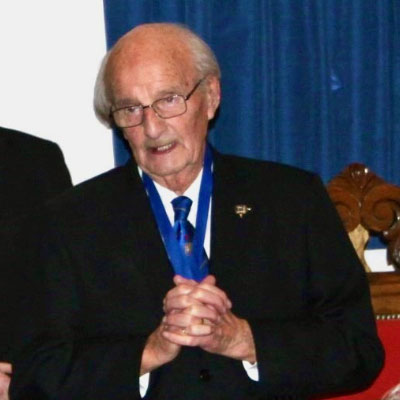It was a very special meeting for Semper Fidelis Lodge No 4428, held in the company of Assistant Provincial Grand Master David Barr, as they celebrated the incredible achievement of 70 years as a Freemason of George Coulter, Past Provincial Junior Grand Deacon of the Province of West Lancashire.

When David occupied the chair of King Solomon, his opening remarks were: “No matter what organisation, or what age you are when you join, no one ever expects to achieve 50 years of service; a few may be very fortunate and reach 60 years of service. Tonight, brethren, we are extremely privileged to be able to celebrate with George as he joins that highly select band of brothers in the 70s Club.”
George was born in County Sligo, Ireland, under the star sign of Libra and in the Chinese year of the Rooster. Libras are expert communicators and David informed the brethren that George always knew the perfect words to say in any situation. He is diplomatic, tactful and charismatic according to the situation and he can make friends very quickly.

His father was born in Liverpool and had returned to Ireland to help his uncle George run the family farm. He had been named in a will to get the farm on the death of his uncle, but it was never signed and families being what they are, he lost the farm. This, along with some animosity as having served in the British Army during World War One, necessitated the family moving north to Enniskillen, County Fermanagh in Northern Ireland to work on the Castle Coole Estate owned by Lord Belmore, now a National Trust property. The job came with accommodation but of a very basic kind. They had had to cope without any electricity and no running water.
George’s education was impacted by the war as rationing meant that the bus needed for the eight-mile journey didn’t’ run. Even after moving to Enniskillen, it was still a three-mile walk each way. After moving to Newtownards near Belfast in 1944, he passed the 11-plus examination, but the family’s financial situation meant that grammar school was out of reach to him and work was the only alternative.
It was in 1944 that he joined the scouting movement, becoming King Scout in 1951, receiving the accolade at the Mansion House in London at the same time as the Festival of Britain was in full swing. This was the start of a long and happy involvement with the scouting movement.
In 1947, he took his first job as a shoe salesman, which he hated and he then moved to work in a hardware shop. A serious bout of ill-health struck in 1952 when he contracted tubercular meningitis, so that he was in and out of hospital for two years. The outlook was not good, but advances in medicine eventually provided a cure. In 1955, his career went on the road, delivering motor accessories and televisions. Five years on, he became a commercial traveller selling similar goods. In 1969, he was head-hunted and was asked to join the Burmah Castrol company as an equipment and workshop planner. He had a very successful career with Burmah Castrol and in 1982, he was promoted to Company Engineering Manager for the areas of Northern Ireland, Isle of Man, and the Northwest of England.

One day, whilst driving down a motorway near Belfast, he heard a bang and a hole appeared in the car’s windscreen. He drove to the nearest police station, where they confirmed that someone had taken a pot-shot at him. Luckily, it was a low-velocity round that had not penetrated the glass. He never told his wife about this. As most of the work was in the northwest, he got a transfer to England and a work contact suggested Lytham St Annes as a nice place to live and so he bought his house there. He retired in 1992 and enjoyed a happy retirement in the town.
When George was 20 years of age, he met his wife Jeanette. They were married in August 1959 at St Mark’s Church in Newtownards and honeymooned in Weymouth in Dorset for 10 days. It was his first real holiday as most summers had been spent bringing in the harvest on the family farm. George is very much family-orientated and he hopes to attend his granddaughter’s wedding in Vancouver, Canada, in August.

George’s other interest in life has been the church. In 78 years, he has been a member of three churches: St Marks in Newtownards, Northern Ireland; St Margaret’s in St Annes and now St Annes Parish Church. In Northern Ireland, he served as a church warden and rose to the position of Parochial Nominator, the highest position that a lay person can hold in the Church of Ireland. He has enjoyed the privilege of working with the most senior members of the Irish Church and even entertained in his home for lunch Dr Armstrong, Archbishop of Armagh and Primate of Ireland.
George’s uncle, Thomas Harte, was a member of Harlech Lodge No 165 and his son, James Harte, was the Grand Secretary of the Grand Lodge of Ireland. James Harte asked George whether he would consider becoming a member of the Craft, but he declined. He was later asked by Frank Dickson, who he knew from the church choir and the rest is history. George was initiated into Farmers Lodge No 1000 in the Irish Constitution on 18 February 1955, passed to the second degree on 11 November 1955 and subsequently raised to the sublime degree of a master Mason on 9 March 1956. He was proposed by Frank Dickson and seconded by John Waugh. He progressed through all the offices of the lodge and became WM in 1967. He was installed into the chair of King Solomon by James Harte, Grand Secretary of the Grand Lodge of Ireland. And he has a solid silver coin engraved with his name and a pouch bearing a presentation certificate as master, presented to him in January 1968.
He was also a Royal Arch Mason, having been exalted into Farmers Chapter No 1000 in 1961. Becoming first principal on bonfire night in 1969. As the master of Farmers Lodge, he was invited to the exclusive installation of the Rt Hon, the Earl of Donoughmore, at Freemasons Hall in Dublin on Friday 10 March 1967. George was active in his lodge and became its social secretary, arranging barn dances and BBQs that even then made over £700 per evening. With his prolific charitable money-raising, he was honoured in 1968 when appointed Governor of the Masonic Boys’ Schools, Dublin and the Clonskeagh Girls’ School at Balls Bridge.

Having moved to Lytham in 1983, it was impossible for him to commute to his mother lodge, but irrespective of this, he maintained his membership. Through the church, he was invited to Masonic social events, but at that time, business prevented any commitment to a lodge in the South Fylde Group. One day at the dentist’s, Tony Hale, knowing that George was a Mason, invited him to a lodge dinner at Semper Fidelis Lodge. George said that joining Freemasonry in general and Semper Fidelis Lodge in the South Fylde Group in particular is one of the best things ever to have happened to him. He says that Freemasonry has given him companionship and such friendship and support that he could never have imagined or hoped for. However, joining Semper Fidelis Lodge was not the end of the story; further honours were to follow. In Provincial Grand Lodge, he was appointed to the acting rank of Provincial Assistant Grand Pursuivant in 2017. At the centenary celebrations of Semper Fidelis Lodge in 2022, he received a field promotion to Past Provincial Junior Grand Deacon from the Provincial Grand Master.
David said that George has had a very busy and interesting life, and his service to Freemasonry is an example to us all. He added that we should bring Quingenti Lodge No 8516, the Provincial Grand Stewards Lodge, to Semper Fidelis Lodge to study George’s stewardship under a recognised ‘Master Steward’. With George serving wine, a glass is never half full but always full! David hoped that this evening George had a night off and let the other stewards serve him.
David called on John Robbie Porter to read aloud the certificate from the Provincial Grand Master Mark Matthews. Upon receiving his certificate, all the brethren stood and gave a resounding round of applause. John Robbie then presented George with a Masonic pin badge with the number 70 on it, which resulted in more applause. The atmosphere in the lodge room continued at the festive board where a hearty meal was enjoyed by all. There was laughter and chatter all around. Steven Reid proposed the toast to George’s health with his usual aplomb. George responded with a variety of stories. For example, he knew Lt Col Blair ‘Paddy’ Mayne of SAS fame who was a member of his lodge. Godfrey Hirst then presented George with a collaret with a medal and congratulated him on celebrating his platinum jubilee in Freemasonry and that we all wish him the very best of good health and happiness for many years to come.


